
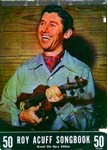


|
 |
|||||||||||||||
|
About The Group 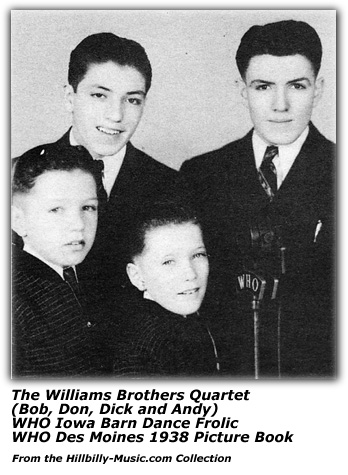

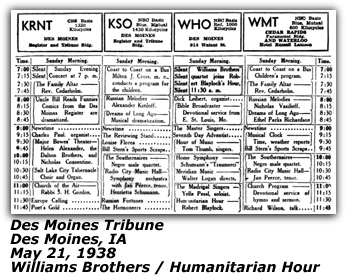
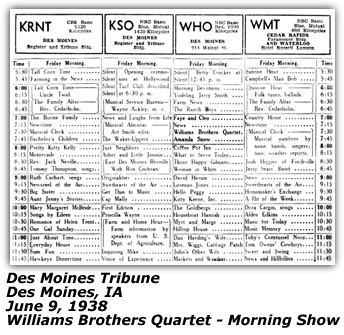

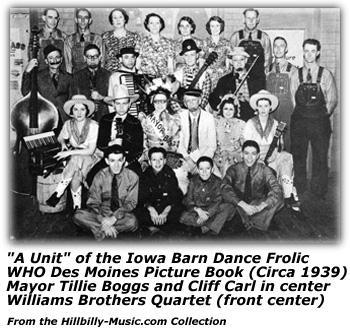

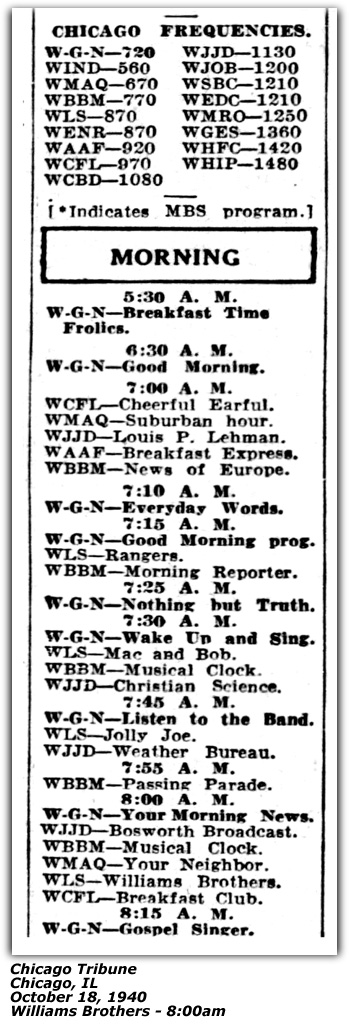
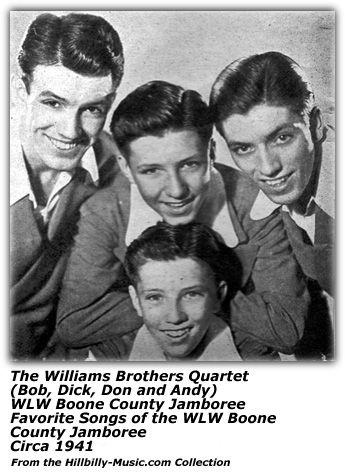
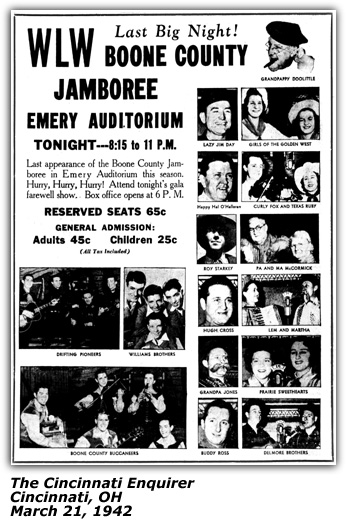
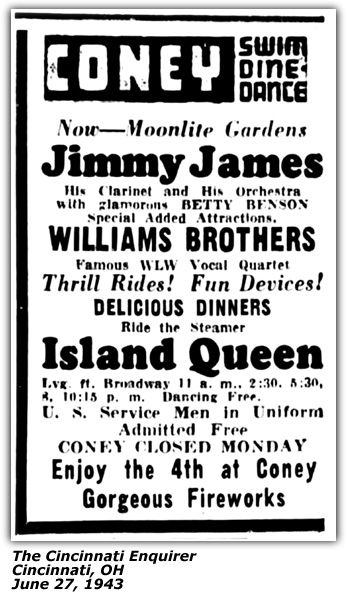
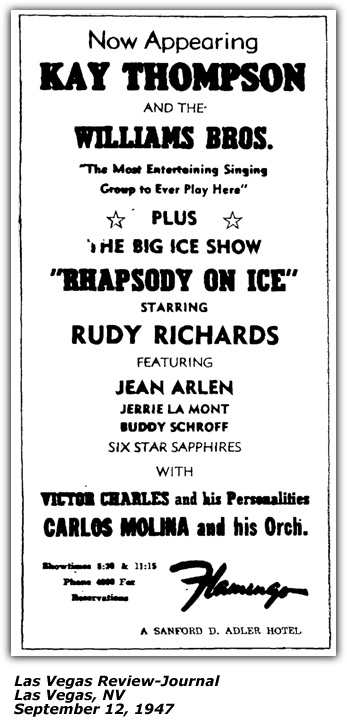
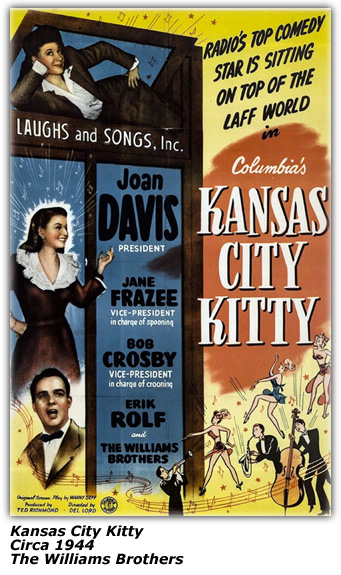
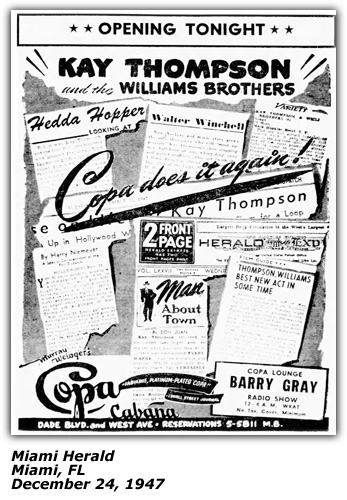

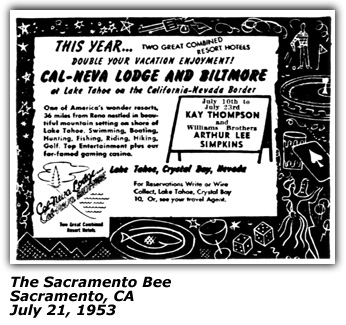
Jay Emerson (B: April 5, 1882 & D: March 5, 1976) and Florence Belle (Finley) Williams were the parents of a quartet of brothers that went on to some fame. The couple was married on June 21, 1916 in Wall Lake, Iowa. The couple moved to Carroll, Iowa where their first son, Robert, was born. The 1930 census shows the family had moved to Wall Lake, Iowa. By then, sons Donald, Richard and Howard had been born. Jay was shown as being a mail clerk. There appears to have been no 1930 census records for the family. The 1940 census shows the family was now living in Des Moines, Iowa. The family now included another son, Andrew and a daughter, Jane. By this time, the four brothers (Robert, Richard, Donald and Andrew) had started appearing on the radio as you will see in this biographical history.
1938 — WHOJanuary 6, 1938 was perhaps the first promotional ad for the WHO Iowa Barn Dance Frolic that mentioned the Williams Brothers Quartet. They shared the stage that night with a guest such as Queenie, the World's Only Educated Cow. Regulars on the show included Grandpa Jitters, Louisiana Lou, the Musical Crawfords and others. The show was at the Shrine Auditorium at 9th and Pleasant Streets in Des Moines. In 1938, the Williams Brothers Quartet as they were known joined the staff of WHO in Des Moines. The brothers joined the Humanitarian Hour program that aired over WHO on Sundays at 11:30am. They were scheduled to appear on the program for ten consecutive weeks. The article announcing their becoming a part of the program included some notes on their aspirations for the future. Don (sings bass in the quartet) was 15 at the time and wanted to be a radio announcer. Bob (baritone) who was 20, wanted to be a physician and optometrist and was actually working in a doctor's office. Dick (tenor) was 11 years old has ideas to become a singing radio announcer. Andy (tenor) was 10 years old was collecting stamps and Canadian coins but wanted to become a radio singer. An article touting the show for Saturday night December 3, 1938 indicated the guests included Jeannie Keaton, a singing and yodeling fiddler; Lois Bullington who finished second in an amateur contest the program held the previous year; Ralph Peer was returning with his "sweet potato" (ocarina) music. Other cast members mentioned in addition to the quartet were Lem and Martha Turner, the Mountaineers, Louisiana Lou, Yodeling Jerry Smith and Bobby Clark along with "others." In 1940, the four brothers were invited to be guests on the WLS National Barn Dance broadcast on Saturday, May 18, 1940. The show would originate from the Eighth State Street Theater in Chicago. The oldest brother, Bob, managed the quartet. They must have went over well with the audiences because they were invited back for another appearance on Saturday, June 29, 1940. 1940 — WLSThe family moved to Chicago in July of 1940. The four brothers had secured a contract to sing over WLS. Dick and Andy who were in junior high were to continue their studies in Chicago. Don graduated from Roosevelt High School in Iowa in June. The family up to that point had lived first in Carroll, then moved to Wall Lake before moving to Des Moines around 1934. In August of 1941, the quartet made a guest appearance on the Uncle Ezra show over the NBC network via WMAQ in Chicago. In another article, we learn the group started as a duo with Bob and Don. But they found duos were not in demand, so they talked their younger two brothers into joining them and promoted themselves as a "close-harmony quartet." Their early efforts began back in Wall Lake, Iowa where the parents were members of a church choir. They entered some local singing contests and won which gave them the idea to do something with their musical abilities. In mid-August, the WLS National Barn Dance cast was to do their Saturday night broadcast from the Indiana State Fair. There was a new stadium on the fair grounds. An article mentioned that fair-goers would have "their first opportunity to see, in person, the new WLS National Barn Dance sensation, the Williams Brothers Quartet, who had joined the Hayloft Gang in July. The WLS group included some 100 entertainers. 1941 — WLWIn early August of 1941, the family moved to Cincinnati, Ohio. WLS had contracted with them to become part of the "Time To Shine" radio program. A promotion for the program indicated that Grandpappy Doolittle and Jimmy Leonard 'whistle the early morning patter' and were accompanied by Tony Walberg. But while the boys were enjoying success, that meant their father, a railway mail clerk, had to take a salary cut for the time he was away; that pattern began in 1937. Into the mid-1940's, World War II interrupted the quartet's musical careers. Robert had registered for the draft on October 16, 1940 in Chicago; he listed his employment as Prairie Farmer - WLS. The obituary for Dick relates that they moved to Los Angeles in 1943. They backed Bing Crosby on his hit, "Swiging On A Star" in 1944.
1943 — HollywoodIn 1944, the Williams Brothers Quartet were heard in the movie "Kansas City Kitty" that starred Joan Davis, Jane Frazeet, Bob Crosby and Erik Rolf. Research indicates they sang the song "The Old Oaken Bucket." They also appeared in "Janie" (1944), "Something In The Wind" (1947) and "Ladies Man" (1947. Dick's obituary indicated that Metro-Goldwyn-Mayer (MGM) had signed them to appear in the films, "Anchors Aweigh" and "Ziegfeld Follies", but before filming even began, their oldest brother, Bob, was drafted into military service and the contract was cancelled. Dick joined his brother in the Merchant Marines in 1944. In 1947, the Williams Brothers Quartet were in the movie "Something In The Wind." It starred Deanna Durbin, Donald O'Connor, John Dall and Charles Winninger. They did a tune called "The Turntable Song" with co-stars Donald O'Connor and Deanna Durbin. Meanwhile, Kay Thompson who had worked on radio previously was in charge of the vocal department at MGM. She hired Don, Dick and Andy to sing her large choir on soundtracks on MGM films such as "The Harvey Girls " (1946). When Bob was discharged from the military, Kay then hired all four brothers to sing on the soundtrack to "Good News" (1947), though uncredited. But Kay wanted to get back into the limelight, so she formed a nightclub act and called it, "Kay Thompson and the Williams Brothers." They made their debut in 1947 and were the proverbial 'overnight sensation.' Their popularity was such that it was said they were the highest paid nightclub act at that time. The brothers broke up with Kay in 1953. It is worth noting the popularity when Kay and the Quartet began their journey. After their initial show at the Flamingo Hotel in Las Vegas, they were booked at "number one place to be seen at around the Los Angeles night club scene at the time - Ciro's. The owner, H. D. Hover told columnist Virginia MacPherson that though it was "meatless Tuesday", they gave the customers what they wanted. He looked around the club and saw the many stars at the tables: Herbert Marshall, Betty Hutton, Judy Garland (Kay was the godmother to Liza Minelli), Keenan Wynn, Ann Miller, Kathryn Grayson, Margaret Whiting, Johnny Merce, Jackie Cooper, Orson Welles and Walter Winchell. He said "This is a big night for us. Kay Thompson's opening tonight. When the ladies put on their ermine coats and men struggle into black ties for a formal party, it'd spoil their evening if we refused to feed them what they ordered." The third annual photographer's costume ball was in October 1947. A star-studded event. Bob Hope was the emcee; some stars were dressed in costumes. Jack Benny was said to have 'brought the house down' with his hillbilly band. Columnist Hedda Hopper wrote, "But it was Kay Thompson and the four Williams brothers who stopped the show. That Thompson gal has the greatest talent I've seen in 10 years. And to think that for years she has been passing on her own style and ability to Metro players." But Kay may have stirred up some jealousy with her new found fame. Ms. MacPherson wrote that Ciro's was "loaded with famous female warblers Sunday night." Yes, they spoke praises of the new star and her time in the spotlight, but she surmised they also wished she would drop dead. Kay was starting to steal their thunder in just a short 10 weeks since her show with the Williams Brothers began. Virginia included some quotes from Kay, "You should have been here opening night. Everybody else was, Judy Garland, Kathryn Grayson, Margaret Whiting, Dinah Shore and Betty Hutton. ... They kept screaming, 'Kay, da-a-ahling! You were simply mah-velous! And I hate you!!!" Kay laughed and said, "They meant every word of it!" She left MGM, created an act for Las Vegas and suddenly was making $20,000 a week. Walter Winchell wrote that their popularity was causing a big drop in business for competing venues in the area. They were playing to 'snowstorms' - referring to all the white tablecloths on the tables with no one sitting there. Let us fast forward to 1953 to the coming end of the partnership between Kay Thompson and the Williams Brothers. Reviews of the act started getting a little less than positive; perhaps seeing the same routines? Ivan Paul wrote in the San Francisco Examiner, "Kay Thompson and the Williams brothers left me cold. To hedge a bit—luke warm." But he felt he was a lone dissenter in an overflow crowd at the Venetian Room at the Fairmont Hotel in downtown San Francisco. Dick Williams noted in his column, "I dunno. Maybe I'm getting too blase or something but I didn't get too steamed up over Kay Thompson and the Williams Bros., who opened at the Mocambo this stanza. Still like her old Brooklyn factor girl bit bets. Other numbers are overarranged for my taste." Then there was Herb Rau in Miami. "Among the night club acts which left us colder than fantail shrimp in a deepfreeze was the act known as Kay Thompson and the Williams Brothers. It was a song-and-dance mish-mash with sophisticated overtones, which Walter Winchell touted as the greatest thing since 7-Up; and, on the strength of his orchids the act quickly hit the $10,000 a week class. They say imitation is a form of flattery, but an impersonator was doing his own take of the Kay Thompson and the Williams Brothers night club act. It evidently was popular, but it did stir up some resentment with Kay. In December of 1953, the end of the act was in sight. Hedda Hopper wrote, "That guy who does a female impersonation of Kay Thompson ought to ge ashamed of himself. Kay's working on a new act with Bob Alton which she'll take to New York on Jan. 14 (1954). This time she'll go it alone. Kay's a talented lass. Every musical star ever on the MGM lot - from Judy Garland up or down - has reason to be grateful to her." Columnist Louella Parsons chimed in, "I hope it's not true that Kay Thompson plans to go out on her own without the Williams brothers. She tried it once before and it was no go."
After the split with Kay, the Williams brothers went their separate ways with their own solo careers. Dick went on to sing with the Harry James band, appeared on Tennessee Ernie Ford's television show and did two albums. Columnist Hedda Hopper wrote in her column that the four Williams Brothers "who are terrific" were signed for "Anchors Aweigh." However, research of this movie does not indicate they were part of the cast or music. Bob Williams died in Terra Bella, CA in September 2003. His obituary indicated he had been a citrus farmer for over 40 years. Dick registered for the draft in Culver City, California on June 7, 1944. He was working on the MGM Maxwell House Radio program at the time. He ended up serving with the Merchant Marines until the war ended in 1945 as did Robert. Only the youngest, Andy Williams stuck to the music business. He kinda went on to bigger things later on in show business with his own variety show on television. In February 1968, he hosted the first "Andy Williams Golf Tournament" that was held in San Diego at Torrey Pines. In a Larry King interview in May of 2001, he said he felt it had run its course after 20 years and gave it up, though he indicated there were some differences with other involved in that decision. His was the third celebrity hosted golf tournament. First was Bing Crosby, then Bob Hope hosted one. In the last chapter of his life, he moved to Branson, Missouri where he was behind the development of the "Andy Williams Moon River Theatre" that opened on May 1, 1992. While perhaps he had left his country roots behind him when the quartet broke up, he was considered the first "non-country performer" to open a theater in Branson that led to others following his lead. Andy's solo career is not the subject of this biography which focuses just on those early years that the Williams Brothers Quartet gained fame over the radio air waves.
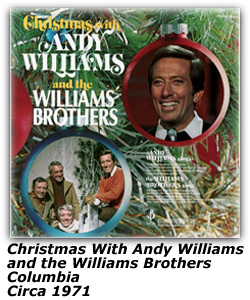
Family Notes: Group Members included:
Credits and Sources
Read More About The Group
|
Hillbilly-Music.com
Yes, Hillbilly Music. You may perhaps wonder why. You may even snicker. But trust us, soon your feet will start tappin' and before you know it, you'll be comin' back for more...Hillbilly Music.
Hillbilly-music.com ...
It's about the people, the music, the history.
|
Copyright © 2000—2023 Hillbilly-Music.com
|
||||